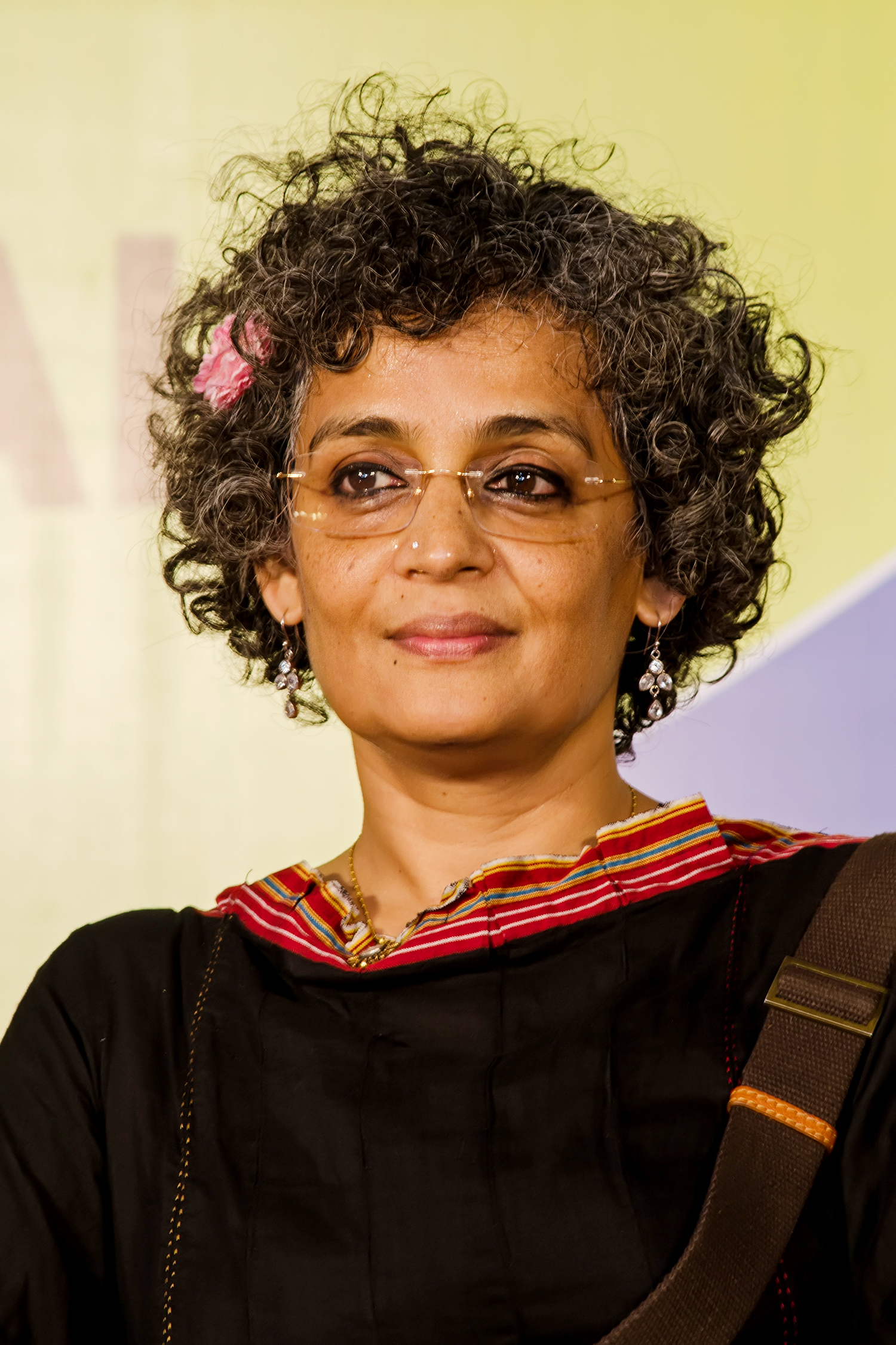Frases célebres de Arundhati Roy
Arundhati Roy: Frases en inglés
Why America must stop the war now (23 October 2001) http://www.theguardian.com/world/2001/oct/23/afghanistan.terrorism8.
Articles
“Literature is the opposite of a nuclear bomb.”
From a speech entitled Come September http://ada.evergreen.edu/~arunc/texts/politics/comeSeptember.pdf.
Speeches
The Guardian, Arundhati Roy https://www.theguardian.com/commentisfree/2010/oct/28/arundhati-roy-india-kashmir-bjp
On the American election, 2004 from her speech in San Francisco, California on August 16th, 2004 http://www.zmag.org/content/showarticle.cfm?SectionID=40&ItemID=6087
Speeches
“Thirty-one.
Not old.
Not young.
But a viable die-able age.”
The God of Small Things (1997)
From an interview with Andrew Denton on Enough Rope screened 18th October 2004 on ABC Australia http://www.abc.net.au/tv/enoughrope/transcripts/s1219838.htm
Interviews
Fuente: An Ordinary Person's Guide to Empire (2005), p. 48
Marino, Andy (2014). Narendra Modi: A political biography. Ch. 7.
[Elst, Koenraad, Rao, Prof. Ramesh N., Gujarat after Godhra: real violence, selective outrage, 2003, Har Anand Publications, https://books.google.co.in/books?id=GuJtAAAAMAAJ, With]
Arundhati Roy: Literature provides shelter. That's why we need it (abridged version of her PEN America Arthur Miller Freedom to Write Lecture,) The Guardian https://www.theguardian.com/commentisfree/2019/may/13/arundhati-roy-literature-shelter-pen-america (13 May 2019)
Articles
Arundhati Roy, To the Jaffri Family, An Apology . May 27, 2002 . Quoted from The God of false things : How Arundhati Roy creates fake news and gets away with it https://www.opindia.com/2017/05/the-god-of-false-things-how-arundhati-roy-creates-fake-news-and-gets-away-with-it/
Arundhati Roy commenting on the Godhra train attack The God of false things : How Arundhati Roy creates fake news and gets away with it https://www.opindia.com/2017/05/the-god-of-false-things-how-arundhati-roy-creates-fake-news-and-gets-away-with-it/ also https://www.opindia.com/2019/04/urban-naxals-congress-hacks-and-eminent-historians-what-media-wont-tell-you-about-writers-who-signed-the-anti-modi-statement/ (Her statement was criticized as being counter-factual.)
Narendra Modi Interview given to Rediff, "'The BJP is unstoppable'" http://www.rediff.com/news/2002/aug/27inter.htm (27 August 2002).
Arundhati Roy: Tide? Or Ivory Snow? Public Power in the Age of Empire, Speech, San Francisco, California https://www.democracynow.org/2004/8/23/public_power_in_the_age_of (16 August 2004)
Speeches
..The term “anti-American” is usually used by the American establishment to discredit...its critics. Once someone is branded anti-American, the chances are that he or she will be judged before they are heard, and the argument will be lost in the welter of bruised national pride.<BR>But what does the term “anti-American” mean? Does it mean you are anti-jazz? Or... opposed to freedom of speech?...That you have a quarrel with giant sequoias? Does it mean that you don’t admire the hundreds of thousands of American citizens who marched against nuclear weapons, or the thousands... who forced their government to withdraw from Vietnam? Does it mean that you hate all Americans?<BR> This sly conflation of America’s culture, music, literature, the breathtaking physical beauty of the land, the ordinary pleasures of ordinary people with criticism of the U.S. government’s foreign policy (about which, thanks to America’s “free press”, sadly most Americans know very little) is... extremely effective strategy.<BR>To call someone “anti-American”, indeed to be anti-American, (or for that matter, anti-Indian or anti-Timbuktuan) is not just racist, it’s a failure of the imagination. An inability to see the world in terms other than those the establishment has set out for you... If you don’t love us, you hate us... If you’re not with us, you’re with the terrorists.
Come September, given at the Lensic Performing Arts Center, Santa Fe, NM, USA http://ada.evergreen.edu/~arunc/texts/politics/comeSeptember.pdf (29 Sep 2002).
Speeches
So there is a psychotic refusal to understand that the survival of the species is connected to the survival of the planet, you know? Because this sort of progress is a kind of church now. It is not amenable to reason. So it is very difficult to know how any real conversation can happen... <Br> A month or two ago, the Supreme Court of India...said that two million indigenous people should be evicted from their forest homes... Because that forest needs to be preserved as a sanctuary. But when, for the last 25 years, people were fighting against projects which were decimating millions of hectares and acres of forest, nobody cared... And when you are talking about evicting two million of the poorest people, stripping them of everything they ever had, there is little outrage. Any sense of talk of equality or justice seems to just have the same effect that blasphemy has in religious societies. That is what capitalism has become—a form of religion that will brook no questioning.
Democracy Now Arundhati Roy: Capitalism Is “a Form of Religion” Stopping Solutions to Climate Change & Inequality https://www.democracynow.org/2019/5/13/arundhati_roy_capitalism_is_a_form, (13 May 2019)
Interviews
Arundhati Roy: They are trying to keep me destabilised. Anybody who says anything is in danger https://www.theguardian.com/books/2011/jun/05/arundhati-roy-keep-destabilised-danger, (5 June 2011)
Articles, Interviews
Fuente: Articles, Come September (29 Sep 2002)
Fuente: Articles, Come September (29 Sep 2002)
Fuente: Articles, Come September (29 Sep 2002)
Fuente: Articles, Come September (29 Sep 2002)
Fuente: Articles, Come September (29 Sep 2002)
Fuente: Articles, Come September (29 Sep 2002)
Fuente: Articles, Come September (29 Sep 2002)
“Nationalism of one kind or another was the cause of most of the genocide of the twentieth century.”
Fuente: Articles, Come September (29 Sep 2002)
